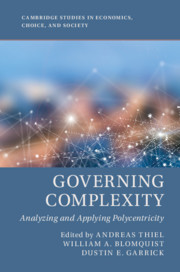Book contents
- Governing Complexity
- Cambridge Studies in Economics, Choice, and Society
- Governing Complexity
- Copyright page
- Contents
- Figures
- Tables
- Boxes
- Contributors
- Acknowledgements
- Introduction
- Part I Foundations for Understanding and Researching Polycentric Governance
- 1 An Introduction to Polycentricity and Governance
- 2 Seeing Polycentrically
- 3 Foundational Aspects of Polycentric Governance
- 4 Evolutionary Institutional Change and Performance in Polycentric Governance
- Part II Interactions and Performance in Polycentric Governance
- Part III Constituting Polycentric Governance
- Conclusions
- References
- Index
3 - Foundational Aspects of Polycentric Governance
Overarching Rules, Social-Problem Characteristics, and Heterogeneity
from Part I - Foundations for Understanding and Researching Polycentric Governance
Published online by Cambridge University Press: 13 September 2019
- Governing Complexity
- Cambridge Studies in Economics, Choice, and Society
- Governing Complexity
- Copyright page
- Contents
- Figures
- Tables
- Boxes
- Contributors
- Acknowledgements
- Introduction
- Part I Foundations for Understanding and Researching Polycentric Governance
- 1 An Introduction to Polycentricity and Governance
- 2 Seeing Polycentrically
- 3 Foundational Aspects of Polycentric Governance
- 4 Evolutionary Institutional Change and Performance in Polycentric Governance
- Part II Interactions and Performance in Polycentric Governance
- Part III Constituting Polycentric Governance
- Conclusions
- References
- Index
Summary
In this chapter we address what we consider to be foundational aspects shaping emergent polycentric governance. They explain the scalar organization and diversity of governance arrangements as well as its performance. We argue that polycentric governance is founded on particular overarching rules that enable self-organization by those involved in governance of collective goods. Polycentric governance offers diverse ways to address social problems and performance criteria that actors introduce into negotiations over governance. Variability in social-problem characteristics leads to variable governance structures and performance. Heterogeneity of communities provides a further explanation of why people prioritize differing criteria of performance and pursue their aims through a diversity of governance arrangements. The chapter elaborates on the foundational roles of these variables for polycentric governance, and highlights gaps in research on these issues.
Keywords
Information
- Type
- Chapter
- Information
- Governing ComplexityAnalyzing and Applying Polycentricity, pp. 65 - 90Publisher: Cambridge University PressPrint publication year: 2019
Accessibility standard: Unknown
Why this information is here
This section outlines the accessibility features of this content - including support for screen readers, full keyboard navigation and high-contrast display options. This may not be relevant for you.Accessibility Information
- 11
- Cited by
